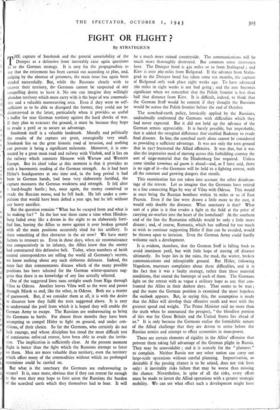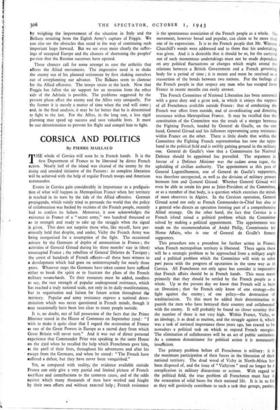FIGHT OR FLIGHT?
By STRATEGICUS
THE. capture of Smolensk and the general unsuitability .of the Dnieper as a defensive front inevitably raise again questions as to the German strategy. It is easy for the propagandists to say that the retirement has been carried out according to plan, and, judging by the absence of prisoners, the main issue has again been
evaded successfully. But, while the Russians clearly wish to recover their territory, tilt! Germans cannot be suspected of any compelling desire to leave it. No one can imagine they willingly abandon territory which must carry with it the hope of war commodi- ties and a valuable manoeuvring area. Even if they were so self- sufficient as to be able to disregard the former, they could not be disinterested in the latter, particularly when it provides so useful a buffer for true German territory against the hard shocks of war. If they plan to evacuate the ground, it must be because they hope to evade a peril or to secure an advantage.
Smolensk itself is a valuable landmark. Morally and politically the results of the capture are great, strategically very small.
Smolensk lies on the great historic road of invasion, and nothing can prevent it being a significant milestone. Moreover, it is con- nected by a great main road and railway with Vitebsk, and it lies on the railway which connects Moscow with Warsaw and Western Europe. But its chief value at this moment is that it provides us with a barometric reading of the German strength. As it had been Hitler's headquarters at one time and, in the long period it had been in German hands, had been very elaborately fortified, the capture measures the German weakness and strength. It fell after hard-fought battle ; but, once again, the enemy contrived to evade the Russian noose, and he fell back. He left under a com- pulsion that would have been defied a year ago, but he left without any heavy sacrifice.
But the question remains "What has he escaped from and what is he making for?" In the last war there came a time when Hinden- burg faded away like a dream in the night to an elaborately forti- fied line, leaving the Allies to move against it over broken ground with all the main positions accurately sited for his artillery. Is there something of that character in the air now? We have many factors to reassure us. Even in those days, when air reconnaissance was comparatively in its infancy, the Allies knew that the enemy had constructed this defensive belt. Today, when numbers of brisk neutral correspondents are telling the world all Germany's secrets, we know nothing about any such elaborate defences. Indeed, the mere fact that commentators discuss which of the many possible positions has been selected for the German winter-quarters sug- gests that there is no knowledge of any line actually selected.
One of the suggested lines runs straight south from Riga through Vilna to Odessa. Another leaves Vilna well to the west and passes through Minsk to end, like the other, in Odessa. Both are a matter of guesswork. But, if we consider them at all, it is with the desire to discover how they fulfil the tests suggested above. It is easy
to understand the peril from which it is hoped they will enable the German Army to escape. The Russians are endeavouring to bring the Germans to battle. For almost tin ee months they have been attempting to compel Hitler to fight on ground, and under con- ditions, of their choice. So far the Germans, who certainly do not lack courage, and whose discipline has stood the most difficult test of continuous enforced retreat, have been able to evade the invita- tion. The implication is sufficiently clear. At the present moment flight is better than the fight which the Russians attempt to force on them. Men are more valuable than territory, even the territory which offers many of the commodities without which no prolonged operations could be carried on.
But what is the sanctuary the Germans are endeavouring to secure? It is, once more, obvious that if they can retreat far enough to the west they may hope to foist upon the Russians the burden of the scorched earth which they themselves had to bear. It will
be a much more ruined countryside. The communications will be much more thoroughly destroyed. But common sense intervenes here. _ The Dnieper bend is 450 miles or so from Stalingrad ; and Kiev is over 260 miles from Bielgorod. If the advance from Stalin- grad to the Dnieper bend has taken some ten months, the capture of Bielgorod only took place eight weeks ago. To have advanced 260 miles in eight weeks is not bad going ; and the rate becomes significant when we remember that the Polish frontier is less than , half that distance from Kiev. It is difficult, indeed, to think that the German Staff would be content if they thought the Russians would be across the Polish frontier before the end of October.
The scorched-earth_ policy, heroically applied by the Russians, undoubtedly confronted the Germans with difficulties which they had never expected. But it did not hold up the advance of the German armies appreciably. It is barely possible, but improbable, that it added the marginal difference that-enabled Budenny to evade final disaster. In fine, the scorched earth alone cannot be considered as providing a sufficient advantage. It was not only the torn ground that in 1917 frustrated the Allied offensive. It was that, but it was also the imperative need of moving across this forbidding country the sort of siege-material that the Hindenburg line required. Unless some similar terminus ad quem is ahead—and, as I have said, there is no sign of it—the Germans will be held to a fighting retreat, with all the constant and growing dangers that entails.
This examination has not taken into account the other disadvan- tage of the retreat. Let us imagine that the Germans have retired to a line connecting Riga by way of Vilna with Odessa. This would at once bring the Russian bombers within 70 miles or so of East Prussia. Even if the line were drawn a little more to the east, it would only double the distance. What sanctuary is that? What sort of a plan is it that evades a fight in the field at the price of carrying air-warfare into the heart of the homeland? At the southern end of the line the Rumanian oilfields would be only a little more distant ; and, of course, Rumania, which has suffered far too much to wish to continue supporting Hitler if that can be avoided, would be thrown open to invasion. Even the German Army could hardly welcome such a development.
It is evident, therefore, that the German Staff is falling back to avoid imminent peril, but with little hope of staving off disaster ultimately. Its hope lies in the rains, the mud, the winter, broken communications and inhospitable ground. But Hitler, following Napoleon, murmurs complaints about these difficulties, and it is the fact that it was a faulty strategy, rather than these material conditions, that snared the footsteps of each of them. The Germans fight on the retreat with as vague a military hope as any that con- fronted the Allies in their darkest days. That seems to be true ; and the more the German position is examined the more hopeless die outlook appears. But, in saying this, the assumption is made that the Allies will develop their offensive south and west with the greatest speed and weight. The Prime Minister said no more than the truth when he announced the prospect, "the bloodiest portion of this war for Great Britain and the United States lies ahead of us." It is only because the Germans realise the formidable nature of the Allied challenge that they are driven to retire before the Russian armies and attempt to effect economies in man-power.
There are certain elements of rigidity in the Allies' offensive that prevent them taking full advantage of the German plight in Russia. They may be unavoidable ; and it is scarcely for the " planners " to complain. Neither Russia nor any other nation can carry out . large-scale operations without careful planning. Improvisation, so desirable if the passing chance is to be seized, does not risk lives only: it inevitably risks failure that may be worse than missing the chance. Nevertheless, in spite of all the risks, every effort must be made to invest the Allied operations with a greater strategic mobility. We can see what effect such a development might have by weighing the improvement of the situation in Italy and the Balkaqs resulting from the Eighth Army's capture of Foggia. We can 240 see the obstacles that stand in the way of continuing such important leaps forward. But we see even more clearly the suffer- ings of occupied Europe and the chances of shortening the peoples' passion that the. Russian successes have opened.
These chances call for some attempt to ease the arthritis that affects the Allied movements. The imperative need is to shake the enemy out of his planned retirement by first shaking ourselves out of overplanning our advance. The Balkans seem to clamour for the Allied offensive. The troops strain at the leash. Now that Foggia has fallen the air support for an invasion from the other side of the Adriatic is possible. The problems suggested by the present phase affect the enemy and the Allies very unequally. For the former it is merely a matter of time when the end will come ; and, in the final analysis, it may be far better that he is determined to fight to the last. For the Allies, in the -long run, a less rigid planning may speed up success and save valuable lives. It must be our determination to prevent his flight and compel him to fight.



























 Previous page
Previous page